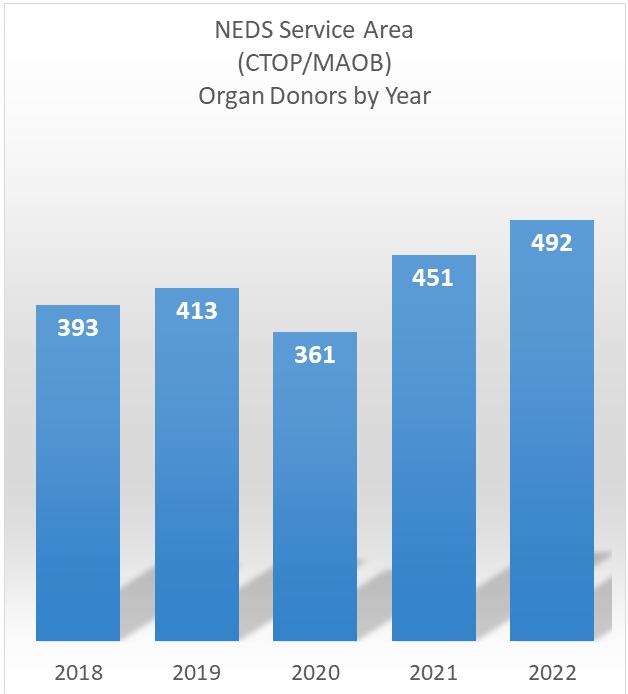On May 4, 2023 Boston public radio station WBUR aired a radio and online story on organ donation in New England that was factually incorrect and made false mischaracterizations about New England Donor Services (NEDS). This occurred even though NEDS President and CEO Alexandra Glazier had a number of recorded interviews and background conversations with the reporter who was provided correct information. NEDS was clear that it is always focused on increasing the availability of organ and tissue for transplant so it is disheartening to have its performance be mischaracterized. False statements damage New England Donor Services’ 55-year established reputation and, most importantly, undermine the public trust and could imperil waitlisted patients who depend on the goodwill of strangers to donate the organ that will save their life.
NEDS suggested the reporter speak to Boston-area transplant surgeons, donor families and donation experts to better understand the work of NEDS and its staff from individuals who had experienced it first-hand. Instead, the reporter chose to speak to individuals outside New England, including a surgeon from Tennessee.
The following information was provided to the WBUR reporter prior to broadcast:
WBUR’s headline: “Major organ center in Waltham flagged over low donation numbers”
Fact: This is false and misleading.
NEDS has not been “flagged” by any federal regulator and in fact NEDS donation rates are reported by CMS to exceed the national median. In terms of donation numbers, in both 2021 and 2022 NEDS ranked #4 in the country in number of organ donors with 451 and 492 donors respectively.
WBUR states: NEDS “earned an underperforming grade in the latest review by the federal government.” The story states five separate times that NEDS is “underperforming” and multiple times that NEDS “earned an underperforming grade”.
Fact: This is false and misleading.
The federal government found that NEDS’ performance exceeds the national median in the latest assessment. According to CMS performance metrics, NEDS is not “underperforming” nor is it “failing”. NEDS is categorized as a Tier 2 OPO and CMS defines Tier 2 OPOs as:
“Tier 2 OPOs are the next highest performing OPOs, where performance on both measures exceed the median but do not reach Tier 1”
For a piece reporting on NEDS’ performance, we find it odd and frustrating that WBUR does not include this definition anywhere in its story or mention that NEDS’ performance that exceeds the median. This was stated clearly during the interview with the reporter. Instead WBUR chose to characterize NEDS as “underperforming” which is not how NEDS’ performance is defined by the federal government.
Since 2020, NEDS has increased organ donation by 36%. This was also shared with the reporter but not included in the story. In fact, other than the impact of COVID in 2020, NEDS has grown organ donation every year for the past 5 years.
WBUR states: “Many OPOs, including New England Donor Services, have relied on revenues from the burgeoning industry of human tissue recovery.”
Fact: This is false and misleading.
NEDS does not “rely” on revenue from tissue donation and, in fact, the financial filings available to the public and provided the reporter demonstrated just the opposite. NEDS tissue operations last year accounted for only 13% of the NEDS budget. This revenue for tissue recovery services is entirely offset by tissue recovery expenses.
WBUR states: “It’s also one of the few organ recovery groups in the country to have its own private jet. The Cessna aircraft, which cost more than $5.6 million, is used to assist with organ recoveries and transports.”
Fact: This is misleading.
NEDS President and CEO Alex Glazier told the reporter that NEDS first leased an airplane exclusively to transport its surgical teams for the recovery of organs for transplant in 2014 and had dedicated charter aircraft agreements in place for many years prior to that time. The lease for NEDS’ aircraft was up in 2017 and at that time, purchase (at $5.6m) rather than renewing the lease was more economical for NEDS. Having available, right-sized air charter to exclusively transport surgical teams and organs as required with very little advance notice has been important to the New England region.


